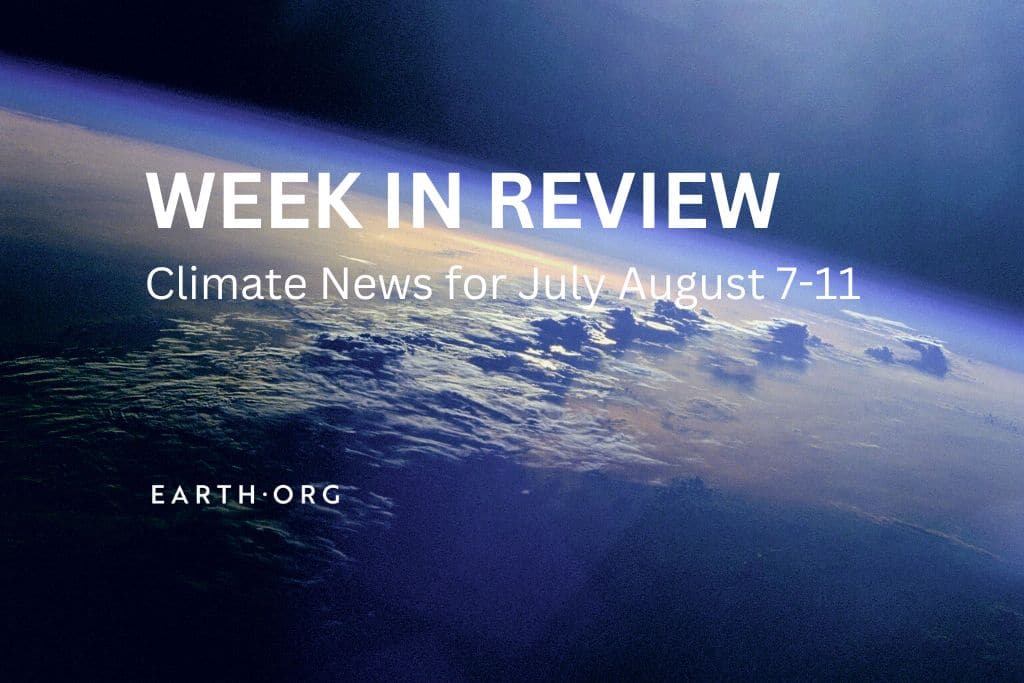This weekly round-up brings you key climate news from the past seven days, including record Mediterranean sea temperatures and Antarctica melting rates as well as a disappointing ending to the Amazon summit in Brazil.
—
1. Amazon Nations Fail to Agree on Common Deforestation Goal at Belem Summit
Leaders from the eight Amazon nations agreed to several unified environmental policies to strengthen regional cooperation at a key two-day meeting in the northern city of Belem, Brazil, but failed to reach an agreement on a much-needed goal for ending deforestation in the Amazon rainforest.
Convened by Brazil’s President Luiz Iñacio Lula da Silva, the summit sought to bring together the eight Amazonian countries in a bit to find common solutions on key issues, including the climate crisis, deforestation, and the protection of Indigenous communities.
While the joint declaration of the members of the Amazon Cooperation Treaty Organization (ACTO) issued on Tuesday created an alliance for combating forest destruction, it did not include a common pledge to end deforestation by 2030, effectively leaving each country to set their own deforestation targets.
Read more here.
2. No Quick Fix to Reverse Antarctic Sea Ice Loss, Scientists Say As Continent Records Minimum Cover Since 1978
There is no quick fix to reverse the damage done in the Antarctic, scientists said in a new paper on the impacts of climate change on the continent.
The study, published Tuesday in the journal Frontiers in Environmental Science, suggests that planet-warming fossil fuels –which have led to a global warming of 1.1C since the Industrial Revolution – are to blame for the rapid loss of Antarctic sea ice. With an additional heating of at least 0.4C now virtually unavoidable, scientists conclude that the continent will experience more pronounced extreme weather events in the years to come, adding that they “cannot rule out future cascades where extreme events may have wide-ranging linked impacts in multiple realms.”
Antarctic sea ice hit an all-time low in February according to NASA. In the same month, a team of scientists that spent nearly two months on West Antarctica’s Thwaites Glacier between late 2019 and early 2020, warned that its collapse could result in more than half a metre (about 1.6 feet) of global sea level rise potential. However, they also found that the melting of the glacier –nicknamed “Doomsday Glacier” because of the catastrophic impact of its potential collapse – could potentially destabilise neighbouring glaciers, resulting in sea level rise of up to three metres (9.8 feet).
Read more here.
3. Mediterranean Sea Surface Temperature Hit Record 28.7C, Highest In Four Decades
The Mediterranean Sea’s surface temperature hit 28.7C (83.7F) last week, the highest median recording since at least 1982, according to Spain’s Institute of Marine Sciences.
The Mediterranean Sea – one of the world’s most diverse habitats for marine life, home to more than 17,000 species – is warming 20% faster than the global average – adding pressure to already strained ecosystems. WWF studies even suggest that the Mediterranean is becoming the “fastest-warming and the saltiest sea on our planet.”
Meanwhile, average daily ocean surface temperatures also broke a 2016 record last week, reaching 20.96C (69.7F), according to climate modelling secretive Copernicus’s measurements. Oceans waters are usually at their hottest globally in March, a factor that makes scientists think the record will be broken several more times in the coming weeks. In places like Florida, ocean temperatures surpassed the 38C (100F) mark, adding to previous warnings over warming water putting marine life and ecosystems in peril.
Read more here.
4. Bangladesh Battles Deadliest Dengue Fever Outbreak on Record as WHO Blames Global Warming for Spike in Cases Worldwide
More than 300 people have died of dengue fever so far this year in Bangladesh, mostly in the densely populated capital Dhaka, placing a great strain on an already overwhelmed and fragile medical system.
According to the latest government figures, approximately 63,700 people have been infected since January across the South Asian nation in what authorities describe as the deadliest year since tracking began in 2000.
Dengue – also known as breakbone fever – is a viral infection that spreads from mosquitoes to people. It is more common in tropical and subtropical climates, with Asia representing almost 70% of global cases.
Read more here.
5. Devastating Maui Wildfires Kill at Least 36 People, Destroy Historic City of Lahaina
Devastating wildfires wreaked havoc on the west coast of the Hawaiian island of Maui on Tuesday and Wednesday, killing at least 36 people and prompting the evacuation of thousands of residents and tourists.
US President Joe Biden issued a major disaster declaration as evacuation centres across the island filled following one of the nation’s deadliest fires in decades. Fuelled by unusual weather conditions including low humidity and strong winds from distant hurricane Dora, flames engulfed the historic town of Lahaina – Maui’s largest tourist destination, destroying much of its homes, businesses, and the harbour. Some residents were forced to jump into the ocean to escape the smoke and flames, prompting the US Coast Guard to rescue them.
According to a statement issued by the White House, the US Coast Guard, the Department of Transportation, and Navy Third Fleets were supporting local authorities’ efforts to evacuate residents and more than 11,000 tourists. Ed Sniffen of the Hawaii Department of Transportation said on Wednesday that airlines were dropping fares to allow people to get off the island through Maui’s fully operating airport.
Read more here.

















